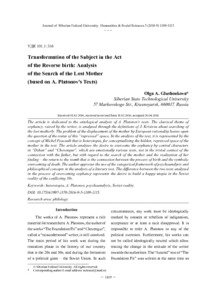Показать сокращенную информацию
Transformation of the Subject in the Act of the Reverse birth: Analysis of the Search of the Lost Mother (based on A. Platonov’s Texts)
| Автор | Glushenkova, Olga A. | en |
| Автор | Глушенкова, О.А. | ru_RU |
| Дата внесения | 2016-05-30T08:53:13Z | |
| Дата, когда ресурс стал доступен | 2016-05-30T08:53:13Z | |
| Дата публикации | 2016-05 | |
| URI (для ссылок/цитирований) | https://elib.sfu-kras.ru/handle/2311/20259 | |
| Аннотация | The article is dedicated to the ontological analysis of A. Platonov’s texts. The classical theme of orphancy, raised by the writer, is analyzed through the definitions of J. Kristeva about searching of the lost motherly. The problem of the displacement of the mother by European rationality leaves open the question of the status of this “repressed” space. In the analysis of the text, it is represented by the concept of Michel Foucault that is heterotopia, for conceptualizing the hidden, repressed space of the mother in the text. The article analyzes the desire to overcome the orphancy by central characters in “Dzhan” and “Chevengur”, which are emotionally various texts, not in the trivial context of the connection with the father, but with regard to the search of the mother and the realization of her finding – the return to the womb that is the connection between the process of birth and the symbolic overcoming of death. The author approves the use of the categorical framework of psychoanalysis and philosophical concepts in the analysis of a literary text. The difference between the two texts analyzed in the process of overcoming orphancy represents the desire to build a happy utopia in the Soviet reality of the conflicting 30s | en |
| Аннотация | Статья посвящена онтологическому анализу текстов А. Платонова. Классическая тема сиротства, поднимаемая писателем, анализируется через понятийный аппарат Ю. Кристевой о поиске утраченного материнского. Проблема вытеснения европейской рациональностью материнского оставляет открытым вопрос о статусе этого «вытесненного» пространства. При анализе текста оно представлено понятием М. Фуко – гетеротопия, для концептуализации скрытого, вытесненного пространства материнского в тексте. Анализируется стремление преодоления сиротства главными героями в эмоционально различных текстах “Джан” и “Чевенгур” не в тривиальном контексте соединения с отцом, а с позиции поиска матери и реализации ее нахождения – возвращения в утробу – замыкания процесса рождения и символического преодоления смерти. Апробируется использование категориальной базы психоанализа и философских понятий при анализе литературного текста. Различие двух анализируемых текстов в процессе преодоления сиротства репрезентирует стремление к построению счастливой утопии в советской действительности противоречивых 30-х годов | ru_RU |
| Язык | en | en |
| Издатель | Сибирский федеральный университет. Siberian Federal University | en |
| Является частью серии | Журнал Сибирского федерального университета. Гуманитарные науки. Journal of Siberian Federal University. Humanities & Social Sciences;2016 9 (5) | en |
| Тема | heterotopia | en |
| Тема | A. Platonov | en |
| Тема | psychoanalysis | en |
| Тема | Soviet reality | en |
| Тема | гетеротопия | ru_RU |
| Тема | А. Платонов | ru_RU |
| Тема | психоанализ | ru_RU |
| Тема | советская действительность | ru_RU |
| Название | Transformation of the Subject in the Act of the Reverse birth: Analysis of the Search of the Lost Mother (based on A. Platonov’s Texts) | en |
| Альтернативное название | Преображение субъекта в акте «обратного рождения»: анализ поиска утраченного материнского (на материале текстов А. Платонова) | ru_RU |
| Тип | Journal Article | |
| Тип | Published Journal Article | |
| Контакты автора | Glushenkova, Olga A.:Siberian State Technological University 57 Markovskogo Str., Krasnoyarsk, 660017, Russia; E-mail: netzumi@mail.ru | en |
| Контакты автора | Глушенкова, О.А.:Сибирский государственный технологический университет Россия, 660017, Красноярск, ул. Марковского, 57 | ru_RU |
| Страницы | 1109-1115 |

